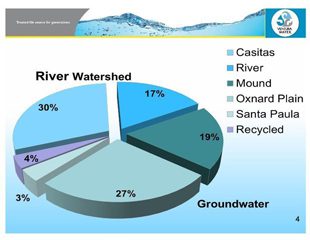
The evidence continues to mount, proving a problem exists with Ventura Water, the Water Commission and VenturaWaterPure. At what point will the City Council stop ignoring the facts and confront the truth about VenturaWaterPure?
Looking The Other Way In The Past
A committee of concerned citizens went to each Councilmember in 2018 to show them Direct Potable Reuse (DPR)—the method of purification Ventura Water was pursuing at the time— was not approved and not yet deemed safe. When the Council presented that fact to Ventura Water, they changed course slightly to Indirect Potable Reuse (IPR). Still they didn’t drop VenturaWaterPure or challenge their assumptions.
The Carollo Report in 2019 presented several options to Ventura to VenturaWaterPure, many of which were less expensive. Ventura Water convinced the City Council to ignore the report’s options and choose VenturaWaterPure.
A September 12, 2019 report titled Ventura Water Supply Projects and Alternatives, commissioned by Ventura Water (Appendix E starting on pg. 405), shows estimated project costs of another $320 Million plus the annual operating expenses of $29.Million for VenturaWaterPure. Yet, the Carollo Report presented options costing a mere $50 Million for the project and operating costs of only $3.9 Million. The City Council overlooked the significant cost differential and stayed with Ventura Water’s proposed VenturaWaterPure.
The Most Recent Evidence
More damning evidence surfaced this month when Water Commissioner George Amandola resigned from the commission. Mr. Amandola explained why he left, citing various problems he saw within Ventura Water, the Water Commission, and the City Council.
His letter read:
Dear Members of the Ventura City Council,
It is with a heavy heart yet a resolute determination that I tender my resignation from the Ventura Water Commission, effective immediately.
This decision has not been arrived at lightly but has been necessitated by deep-seated concerns regarding the trajectory and management of VenturaWaterPure, as well as broader issues plaguing the Water Department organization.
 Throughout my time serving on the commission, I have been disheartened to observe a troubling trend of bureaucratic maneuvering, particularly concerning the handling of commission agendas, council disclosures, and public disclosures. There have been numerous instances where last-minute adjustments to agenda items were required by Commission vote to counteract staff attempts at manipulating certain voting items. These occurrences have unfortunately become all too frequent, significantly hindering our ability to address important matters effectively and fulfill our responsibilities with diligence.
Throughout my time serving on the commission, I have been disheartened to observe a troubling trend of bureaucratic maneuvering, particularly concerning the handling of commission agendas, council disclosures, and public disclosures. There have been numerous instances where last-minute adjustments to agenda items were required by Commission vote to counteract staff attempts at manipulating certain voting items. These occurrences have unfortunately become all too frequent, significantly hindering our ability to address important matters effectively and fulfill our responsibilities with diligence.
Additionally, the consistent scheduling of VenturaWaterPure and CIP discussions on the Council agenda late at night, often after 10pm or 11pm, does not foster transparency with the Ventura community at large. This timing undermines public engagement and limits the opportunity for meaningful community involvement in these crucial discussions.\Furthermore, the persistent absence of timely reporting and clear and comprehensive details within project management items, budget, and supplemental packages preceding meetings has significantly hampered commissioners’ ability to make well-informed decisions. Equally distressing is the subsequent lack of follow-up from staff regarding unresolved matters raised during meetings, exacerbating an atmosphere of opacity and impeding our ability to fulfill our duties diligently.
Moreover, the disregard and blatant dismissal of certain presentation format requests I have made for the Capital Improvement Plan by the general manager is deeply concerning.
My lack of confidence in the project management and financial planning for VenturaWaterPure stems from a myriad of disconcerting factors. Repeated oversights, escalating costs, a glaring lack of transparency from management, and an apparent reluctance to substantiate assumptions and alternatives with tangible evidence have all contributed to a palpable deficit in comprehensive planning and oversight. These shortcomings cast serious doubts on the initiative’s viability and fiscal prudence.
Additionally, I have observed a concerning confirmation bias within both staff and the City Attorney’s office, evident in their unwavering support for VenturaWaterPure despite valid concerns raised. Despite viable technical and financial avenues available to alleviate the burden on ratepayers, the City Attorney’s office has regrettably failed to challenge the Consent Decree through the “meet and confer” process, exacerbating an already precarious situation.
Furthermore, management’s subjective decisioning to take Foster Park Assets offline in preceding years raises significant red flags, hinting at a deliberate attempt to bolster the narrative of VenturaWaterPure’s indispensability. Such manipulative tactics only serve to deepen my skepticism regarding the integrity and motivations underpinning the initiative.
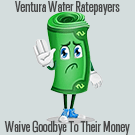 Of particular concern is the potential economic hardship VenturaWaterPure may impose on residents, especially those in District 1 and other vulnerable communities. The absence of a comprehensive economic study examining the ramifications of existing rate increases coupled with the inevitable VenturaWaterPure rate hikes underscores the urgent need for informed decision-making to mitigate adverse impacts on residents.
Of particular concern is the potential economic hardship VenturaWaterPure may impose on residents, especially those in District 1 and other vulnerable communities. The absence of a comprehensive economic study examining the ramifications of existing rate increases coupled with the inevitable VenturaWaterPure rate hikes underscores the urgent need for informed decision-making to mitigate adverse impacts on residents.
Moreover, the limitations imposed on the authority of the Water Commission, particularly its quasi-judicial capacity, are glaring omissions from the municipal code, rendering the commission toothless in effecting meaningful change. Staff’s adeptness at circumventing and manipulating the commission’s role, particularly in controlling information flow between the commission and the City Council, is deeply troubling and undermines the commission’s purpose and effectiveness.
Additionally, the lack of balance in the commission’s composition, as outlined in the municipal code, further compounds concerns. While intended to feature a mix of professionals and non-professionals, the current makeup deviates from this mandate. The presence of Commissioner Armbrister in a non-professional seat despite her professional background in water management raises legitimate questions about the commission’s legitimacy and adherence to residency requirements.
In light of these systemic concerns, urgent and comprehensive reform within the Ventura Water Commission is imperative to restore transparency, accountability, and effective governance. Without decisive action, the community’s best interests will continue to be sidelined, compromising the commission’s effectiveness.
While resigning from my position weighs heavily on me, I refuse to remain complicit in a system that obstructs meaningful change and neglects the welfare of the community. I trust that my resignation will serve as a catalyst for substantive reform and renewed commitment to transparency, accountability, and equitable access to essential services within Ventura Water.
I am profoundly thankful for the opportunity to have contributed to the Ventura Water Commission and treasure the invaluable experiences and insights gained during my tenure. I hold steadfast hope that the Council will heed the compelling reasons outlined in this resignation letter and take decisive action to enact essential reforms within the commission, its municipal code, and the leadership of the Water Department. By doing so, we can safeguard the future well-being of the Ventura community.
Thank you for your attention to this matter.
Sincerely,
George
George Amandola
Resident City of Sanbuenaventura (sic)- Council District 2
Key Points In The Letter
Mr. Amandola’s resignation letter highlights a stultified, bureaucratic, autocratic Ventura Water Department. It presents his lack of confidence in the project management and financial planning for VenturaWaterPure. It also demonstrates how Ventura Water has neutered the Water Commission and prevented it from doing its duty.
These are not frivolous accusations made by an outsider. These are observations made by an insider capable of seeing the entire landscape of what’s happening with VenturaWaterPure.
Editors’ Notes
Evidence of misrepresentation, mistakes and mismanagement surrounding VenturaWaterPure grows. Meanwhile, the project’s costs mount. Today, that costs half a billion dollars, but it’s reasonable to believe the costs will go even higher. With no ceiling on cost increases, Ventura Water ratepayers bear the burden. Soon, the cost of water will triple to pay for the project.

What more evidence does the City Council need to finally admit that there is a problem with the Water Department and the Water Commission spending $500,000,000 on a project that Ventura Water can do for hundreds of millions less? How long will the city hide its head in the sand before taking serious action?
City staff often use the Consent Decree as an obstacle in addressing Ventura’s water problems. This Decree really addresses two issues, and they must be handled separately. Part one is cleaning up the wastewater in the estuary. Extracting the wastewater from the estuary is being accomplished.
Part two is developing a practical use for extracted water. Ventura Water calls the recycled use of the extracted water Ventura WaterPure. Ventura Water mistakenly believes Ventura WaterPure must be a stand-alone facility built within the Consent Decree timeline. The Consent Decree requires neither.
The Consent Decree allows Ventura to extend the timeline under certain conditions. The first is financial feasibility. If Ventura Water can demonstrate that Ventura WaterPure is financially infeasible, the courts can extend the timeline. Additionally, Ventura can prove its sincere effort to comply with the Consent Decree. In that case, the court may extend the deadline if it deems the efforts reasonable and justified.
Another false belief is that Ventura must have a separate, stand-alone facility to treat the extracted water. Oxnard has an underutilized recycling facility that Ventura Water could use to treat the extracted water. However, Ventura Water has refused to consider this option seriously until now.
The City of Ventura must reconsider all options, including treating the wastewater in Oxnard. City officials must formally scrutinize the Oxnard option to be a fair comparison. The city must issue an up-to-date formal Request for Proposal (RFP) to the City of Oxnard and United Water. Oxnard’s and United’s responses must come directly from them (not via a Ventura Water Department Consultant) and be on their letterhead. Ventura WaterPure can no longer have an open-ended budget. It must have a cashflow projection that includes timelines, operating, maintenance and taxpayer fee schedules.
Demand Your City Councilmember Does The Following:
1) Get a new Request for Proposal (RFP) from the City of Oxnard and United Water.
2) Have Ventura Water produce a cash flow projection analysis.
3) Install a new Water Commission, that has the authority to manage this process and make decisions that are in the rate payer’s best interest.
Below you’ll find the photos of our current City Council. Click on any Councilmember’s photo and you’re email program will ready to write directly to that Councilmember.
Let them know what you’re thinking. Tell them what they’re doing right and what they could improve upon. No matter what you write, however, share your opinion. Participating in government makes things better because our city government is working for all of us.
For more information like this, subscribe to our newsletter, Res Publica. Click here to enter your name and email address.
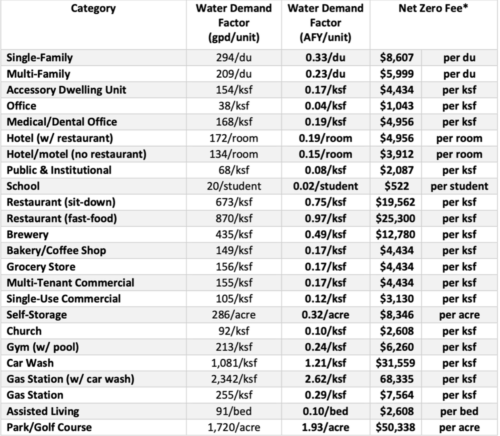









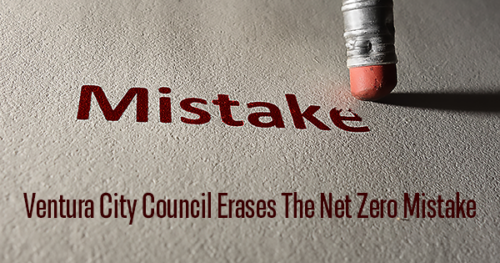


 Throughout my time serving on the commission, I have been disheartened to observe a troubling trend of bureaucratic maneuvering, particularly concerning the handling of commission agendas, council disclosures, and public disclosures. There have been numerous instances where last-minute adjustments to agenda items were required by Commission vote to counteract staff attempts at manipulating certain voting items. These occurrences have unfortunately become all too frequent, significantly hindering our ability to address important matters effectively and fulfill our responsibilities with diligence.
Throughout my time serving on the commission, I have been disheartened to observe a troubling trend of bureaucratic maneuvering, particularly concerning the handling of commission agendas, council disclosures, and public disclosures. There have been numerous instances where last-minute adjustments to agenda items were required by Commission vote to counteract staff attempts at manipulating certain voting items. These occurrences have unfortunately become all too frequent, significantly hindering our ability to address important matters effectively and fulfill our responsibilities with diligence. Of particular concern is the potential economic hardship VenturaWaterPure may impose on residents, especially those in District 1 and other vulnerable communities. The absence of a comprehensive economic study examining the ramifications of existing rate increases coupled with the inevitable VenturaWaterPure rate hikes underscores the urgent need for informed decision-making to mitigate adverse impacts on residents.
Of particular concern is the potential economic hardship VenturaWaterPure may impose on residents, especially those in District 1 and other vulnerable communities. The absence of a comprehensive economic study examining the ramifications of existing rate increases coupled with the inevitable VenturaWaterPure rate hikes underscores the urgent need for informed decision-making to mitigate adverse impacts on residents.


 Ventura Water’s first faulty assumption was debunked in 2016 by an expert panel appointed by the State Legislature. The panel concluded that even after treatment the water was unsafe for human consumption because microscopic contaminants and chemicals pose a danger to humans. The Ventura City Council didn’t learn of the 2016 report until March 2019.
Ventura Water’s first faulty assumption was debunked in 2016 by an expert panel appointed by the State Legislature. The panel concluded that even after treatment the water was unsafe for human consumption because microscopic contaminants and chemicals pose a danger to humans. The Ventura City Council didn’t learn of the 2016 report until March 2019. It’s up to the 2024 City Council to meet their fiduciary duty to Ventura’s citizens. This council has more information about costs and technologies than any previous council. Now is the time to examine all reliable alternatives before continuing with VenturaWaterPure. Past actions by City Councils are no longer relevant to any decisions this City Council takes because technological circumstances and costs have changed to achieve VenturaWaterPure’s goals.
It’s up to the 2024 City Council to meet their fiduciary duty to Ventura’s citizens. This council has more information about costs and technologies than any previous council. Now is the time to examine all reliable alternatives before continuing with VenturaWaterPure. Past actions by City Councils are no longer relevant to any decisions this City Council takes because technological circumstances and costs have changed to achieve VenturaWaterPure’s goals.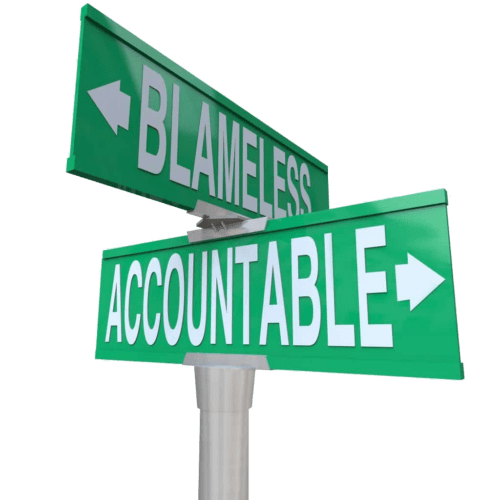 Meeting with Ventura Water’s counterparts is an ambiguous term. What does it mean exactly? Were new quotes or figures discussed? Was there anything that would resemble a Request for Proposal (RFP)?
Meeting with Ventura Water’s counterparts is an ambiguous term. What does it mean exactly? Were new quotes or figures discussed? Was there anything that would resemble a Request for Proposal (RFP)?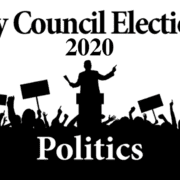


 Candidates for the 2020 City Council election must concentrate on the Wishtoyo Consent Decree, and the impact of the decree in the next decade. That Federal Decree requires Ventura to stop putting a majority of its treated wastewater into the Santa Clara River estuary, beginning in January 2025 through 2030. To do so will be an enormous cost to the city.
Candidates for the 2020 City Council election must concentrate on the Wishtoyo Consent Decree, and the impact of the decree in the next decade. That Federal Decree requires Ventura to stop putting a majority of its treated wastewater into the Santa Clara River estuary, beginning in January 2025 through 2030. To do so will be an enormous cost to the city. Ventura Water has confused the City Council by combining two different ideas to falsely heighten the urgency to drink wastewater. In 2011, Venturans were told, “We are short of water.” Ventura Water proposed treating the wastewater we currently dump into the Santa Clara River into potable water at the cost of $1 Billion.
Ventura Water has confused the City Council by combining two different ideas to falsely heighten the urgency to drink wastewater. In 2011, Venturans were told, “We are short of water.” Ventura Water proposed treating the wastewater we currently dump into the Santa Clara River into potable water at the cost of $1 Billion. 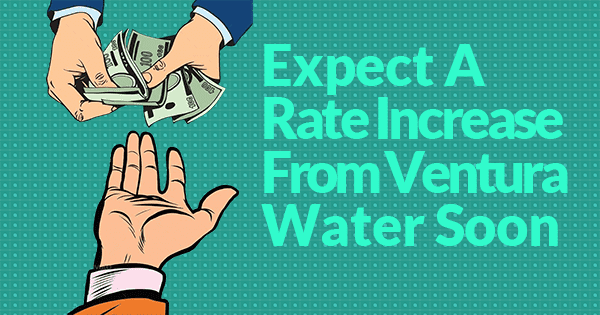 Ventura Water will undoubtedly request a water rate increase from this next City Council. They will claim the money is for VenturaWaterPure or to improve the city’s water infrastructure. Water rates already went up by $220 million with water and wastewater increases in 2012-13. Any Councilmember and any candidate for City Council should be able to explain how Ventura Water spent the $220 million and why another rate hike is needed.
Ventura Water will undoubtedly request a water rate increase from this next City Council. They will claim the money is for VenturaWaterPure or to improve the city’s water infrastructure. Water rates already went up by $220 million with water and wastewater increases in 2012-13. Any Councilmember and any candidate for City Council should be able to explain how Ventura Water spent the $220 million and why another rate hike is needed. Ventura has 555 homeless people, according to the 2019 Point-in-Time count. Meredith Hart, Director of Ventura’s Safe & Clean program, believes the 2020 count will be higher. Ventura spends on its homeless are between $3.89-$4.59M per year.
Ventura has 555 homeless people, according to the 2019 Point-in-Time count. Meredith Hart, Director of Ventura’s Safe & Clean program, believes the 2020 count will be higher. Ventura spends on its homeless are between $3.89-$4.59M per year.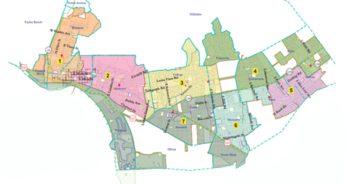
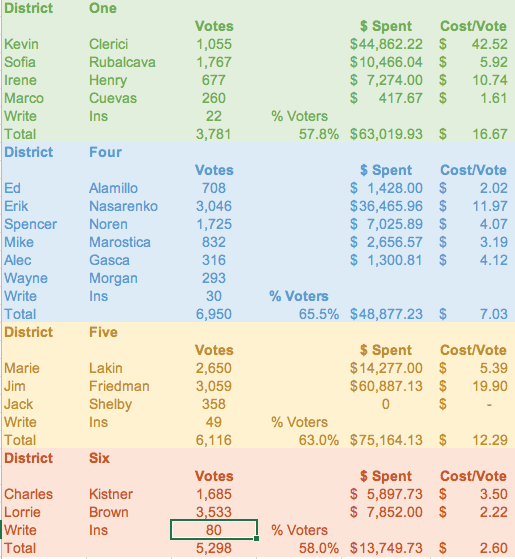









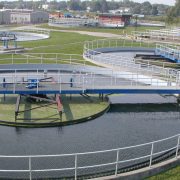

 Ventura needs to get its priorities straight about water—and fast. On July 9th, Ventura Water will ask the City Council to approve direct potable reuse (DPR). Ventura Water views DRP as a primary alternative source for increased drinking water. The project will cost $538 million of taxpayer dollars. The trouble is, it’s an untested, unproven and unregulated solution to our water needs. Why would the City Council gamble with the health of its citizens?
Ventura needs to get its priorities straight about water—and fast. On July 9th, Ventura Water will ask the City Council to approve direct potable reuse (DPR). Ventura Water views DRP as a primary alternative source for increased drinking water. The project will cost $538 million of taxpayer dollars. The trouble is, it’s an untested, unproven and unregulated solution to our water needs. Why would the City Council gamble with the health of its citizens?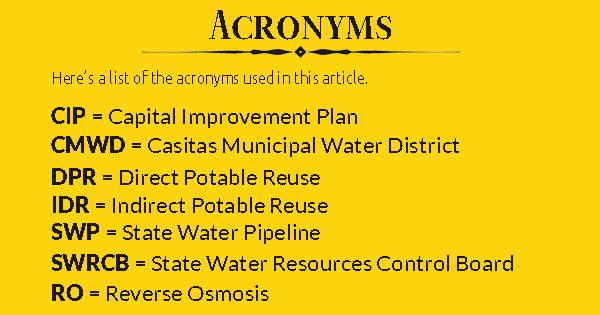 Two legal agreements jeopardize Ventura’s water supply. The first was a Consent Decree requiring Ventura to cease putting 100% of its treated wastewater into the Santa Clara River estuary. It needs to be diverted somewhere else by January 2025.
Two legal agreements jeopardize Ventura’s water supply. The first was a Consent Decree requiring Ventura to cease putting 100% of its treated wastewater into the Santa Clara River estuary. It needs to be diverted somewhere else by January 2025. The new Casitas Water contract entitles Ventura an amount of water based on projected needs and adjusted for drought staging conditions. Ventura Water anticipates our water needs at 5,669 acre-feet per year by 2025. By then, they expect we’ll be out of our current drought conditions. Under the1995 contract, Ventura was allowed a minimum of 6,000 acre-feet of water per year. That water could be used in the western part of Ventura (everything west of Mills Road) and the eastern part of the city, if necessary. The new contract changes that and puts East Ventura at a disadvantage. The old agreement allowed Ventura to blend Casitas water with the East End to achieve better quality.
The new Casitas Water contract entitles Ventura an amount of water based on projected needs and adjusted for drought staging conditions. Ventura Water anticipates our water needs at 5,669 acre-feet per year by 2025. By then, they expect we’ll be out of our current drought conditions. Under the1995 contract, Ventura was allowed a minimum of 6,000 acre-feet of water per year. That water could be used in the western part of Ventura (everything west of Mills Road) and the eastern part of the city, if necessary. The new contract changes that and puts East Ventura at a disadvantage. The old agreement allowed Ventura to blend Casitas water with the East End to achieve better quality. 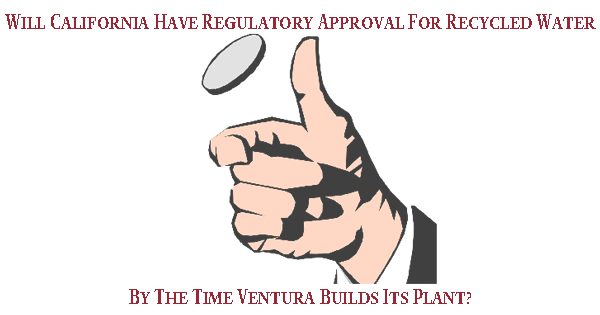 In August 2016, a report by a state-appointed panel of experts concluded it was “technically” feasible to use DPR, but there are serious health risks. Here are some fundamental problems outlined:
In August 2016, a report by a state-appointed panel of experts concluded it was “technically” feasible to use DPR, but there are serious health risks. Here are some fundamental problems outlined: The cost of DPR wastewater is high. According to the Capital Improvement Plan (CIP), the wastewater and water costs will total approximately $538 million once financing costs are added. Included in those costs are advanced purification facilities to treat the wastewater that will cost $77.7 million. Also included is another $170 million to pump the water north to the desalination/Reverse Osmosis plant. Other infrastructure improvements comprise the remaining costs—including a brine line to carry away contaminants from the new RO plant.
The cost of DPR wastewater is high. According to the Capital Improvement Plan (CIP), the wastewater and water costs will total approximately $538 million once financing costs are added. Included in those costs are advanced purification facilities to treat the wastewater that will cost $77.7 million. Also included is another $170 million to pump the water north to the desalination/Reverse Osmosis plant. Other infrastructure improvements comprise the remaining costs—including a brine line to carry away contaminants from the new RO plant. The City Council must make a policy decision now and direct Ventura Water to concentrate on the importation of State Water immediately. The current effort to plan, finance and build a VenturaWaterPure treatment plant and RO plant to process recycled water for DPR by 2025 must stop or at the very least be delayed until further study. We only hope that the City Council has the leadership and strength to change course and not feel bound by this misguided concept of past water leaders.
The City Council must make a policy decision now and direct Ventura Water to concentrate on the importation of State Water immediately. The current effort to plan, finance and build a VenturaWaterPure treatment plant and RO plant to process recycled water for DPR by 2025 must stop or at the very least be delayed until further study. We only hope that the City Council has the leadership and strength to change course and not feel bound by this misguided concept of past water leaders.














